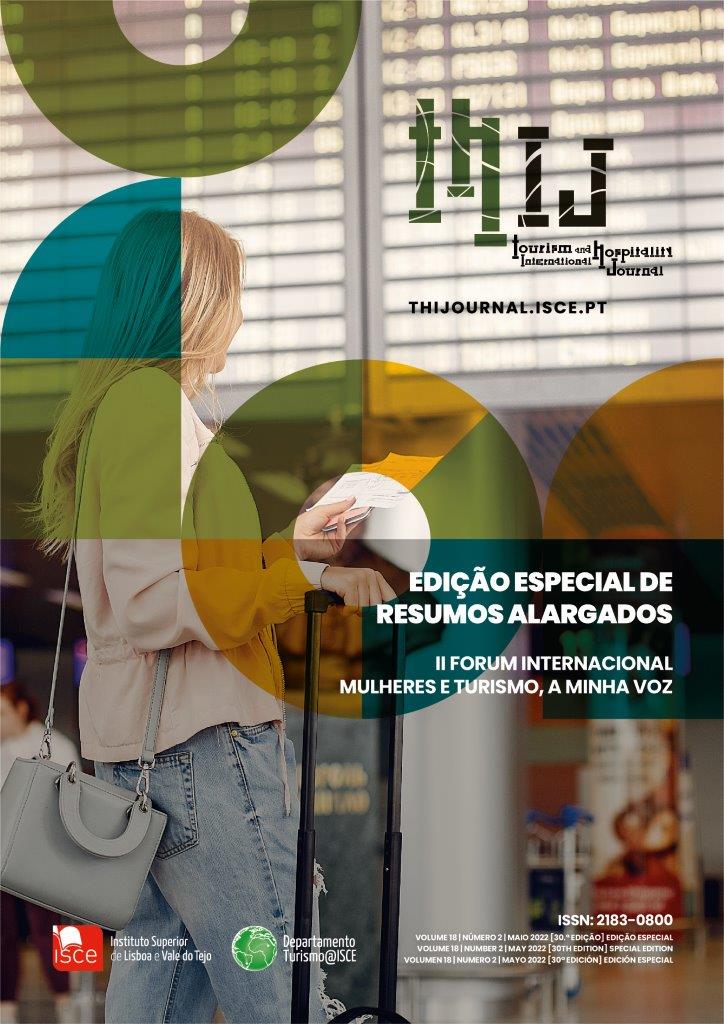Gender mainstreaming in Brazilian tourism and responsible planning
DOI:
https://doi.org/10.57883/thij18(2)2022.31105Abstract
Human societies have been structured on historical and cultural bases that are based on the perceived differences between the sexes, assigning different values to them, leading to different social positions and conditions between men and women, characterizing gender inequalities. These manifest themselves in different ways and intensities, but traditionally place women in subordinate positions to men in the most distinct spheres, besides being present in all social relations, since they are structural to them. Thus, after centuries of reflections and claims, it is currently possible to observe that social gender relations constitute a rich theoretical framework, especially in the social sciences (but not only), besides being the central focus of social movements that aim at improving the quality of life of the population in general, and are perceived as a central element for the proposition of actions aimed at sustainability. As in the case of the 2030 Agenda for Sustainable Development, articulated by the United Nations (UN) in 2015, which brings gender equality as Sustainable Development Goal Sustainable Development Goal 05.
References
Andrade, S. dos S., Meyer, D. E. E., & Barzotto, C. E. (2019). Transversalidade de gênero em políticas públicas: uma revisão de literatura. Revista Prâksis, 2, 81–106.
https://doi.org/10.25112/rpr.v2i0.1816
Brasil (2020). Secretaria Especial de Políticas Públicas para as Mulheres. Brasília: [s/n], recuperado em 15 de mai de 2021 de https://www.gov.br/mdh/pt-br/acesso-a-informacao/acoes-eprogramas/secretaria-nacional-de-politicas-para-mulheres
Ministério do Turismo. (2018). Plano Nacional de Turismo 2018 - 2022 : mais emprego e renda para o Brasil. Recuperado em 15 de mai de 2021, de http://www.turismo.gov.br/plano-nacionaldo-turismo.html
Oliveira, S., Fontana, R. (2006). Turismo Responsável: uma alternativa ao turismo sustentável?Trabalho apresentado ao GT2 “Abordagem Histórico – Crítica do Turismo” do IV Seminário de Pesquisa em Turismo do MERCOSUL (anais).
Organização das Nações Unidas. (2000). United Nations Millennium Declaration DPI/2163 —Portuguese — 2000. Published by United Nations Information Centre, Lisbon. Recuperado em10 de mai de 2021, de https://www.br.undp.org/content/brazil/pt/home/library/ods/declaracaodomilenio.html
Prá, Jussara. (2010). Políticas para mulheres: Transversalizar é preciso. In: Travessias de gênero na perspectiva feminista . Alves, Ivia. et. al (orgs). Salvador : EDUFBA/NEIM. – (Coleção Bahianas;12).
Sardenberg, Cecília. (2010) Da transversalidade à transversalização de gênero - aportes conceituais e prático-políticos. In: Travessias de gênero na perspectiva feminista . Alves, Ivia. et. al (orgs).Salvador : EDUFBA/NEIM – (Coleção Bahianas; 12).
United Nations World Tourism Organization. (2020). Global report on women in tourism: Second edition. Recuperado em 15 de abril de 2020, de https://www.unwto.org/publication/global-report-women-tourism-2-edition
Downloads
Published
How to Cite
Issue
Section
License
Copyright (c) 2021 This work is licensed under a Creative Commons - Attribution 4.0 International (CC BY 4.0)

This work is licensed under a Creative Commons Attribution 4.0 International License.
This work is published under the Creative Commons Attribution 4.0 International License.






